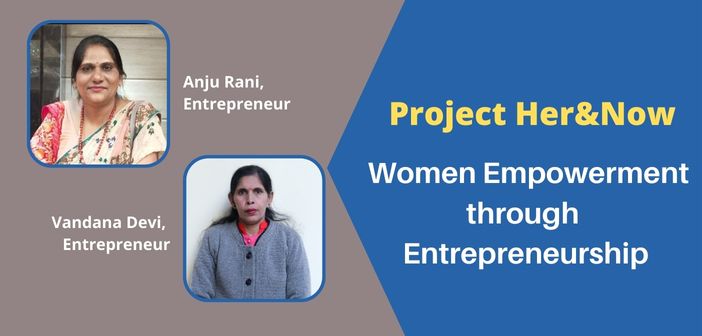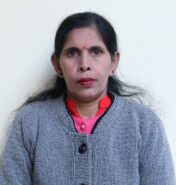An increasing number of women entrepreneurs in India are significantly contributing to the growth of India’s economy, generating employment, bringing in the demographic shifts in businesses and inspiring future generations to take up entrepreneurship.
Women’s entrepreneurship has grown remarkably in recent years, gaining academic acceptance and, most importantly, aiding in the understanding of all the elements that explain how it can be challenging for women to pursue entrepreneurship as a career and contribute to the economy.
Several initiatives and interventions are needed to address the challenges of women entrepreneurs and to aid them in contributing to the sustainable development and balanced growth of the country. We discussed one such initiative, Project Her&Now with Ms. Prtitha Dutt, CEO of Empower Foundation and Director of Empower Pragati.
Project Her&Now, an initiative by GIZ (Germany), aims to contribute to a more enabling environment for women-led enterprises in India. Empower Foundation has been the implementation partner to the successfully concluded Project Her&Now.
Learn more about the Project Her&Now, the challenges and some inspiring success stories of women entrepreneurs, in this conversation with Ms. Prtitha Dutt, CEO of Empower Foundation and Director of Empower Pragati.
Below are a few excerpts from our conversation. You can watch the full video on our YouTube channel.
Q: Could you give us an overview of Project Her&Now and about the partnership with GIZ in implementing the programme?
A: While there is an improvement in education and health aspects, in the aspect of livelihood and entrepreneurship, India is still at 143 out of 146 countries according to the World Economic Forum’s Global Gender Gap Report 2022.
Women are usually not allowed or have fewer opportunities to start something of their own. That is why we need to take measures to give women an equal chance for becoming entrepreneurs. Independent women find it easier to enter the apparel or beauty industry because it allows them to manage work and family and is flexible, but this is not the case for wage employment.
When the lockdown occurred, we concluded that we must launch a widespread effort that enables women to seek employment. Since GIZ has been running the Project Her&Now in the country for about 5-6 years, we contacted them and offered them a model. The fact that we have worked in this field for so long has helped us and they also offered us some insights, and we started this project in the middle of the lockdown.
Over the past 14 months, nearly 300 female entrepreneurs have grown and about 220 women registered their businesses and currently have a business plan and space.
Q: What are some of the learnings and best practices from the Project Her&Now?
A: As the project has just come to an end, it has only motivated me individually and as a company to scale up and consider beginning or launching a gigantic stride in this field. We have observed the level of hunger, willingness, and ambition that women exhibit while beginning their own businesses, especially in tier 2 regions.
Women come and inquire about loans, funding, business plans, competitors, understanding the industry, marketing, and product prices, to name a few things. Then the realisation strikes that knowledge and interpersonal interactions are also required. One important lesson, in my opinion, is the “Power of Mentoring”, a mentor’s capacity to manage and keep women on the course is significant. In collaboration with GIZ, we reasoned that developing a national standard for entrepreneurship would be a wonderful way to accelerate the efforts and turn it into a widespread movement.

Q: When we think of an entrepreneur, we associate it with an organized start-up. But in reality, most of it is unorganised. How can we make it organised and make it more sustainable?
A: Women-led enterprises are mostly unorganised, but it has the potential to become organised. For example, the very act of establishing the business on the UDYAM portal or obtaining a GST registration would organise the enterprise. Every firm, whether it is a one-person or multi-person operation, can become organised. Our government is pushing for formalisation whereas without it, one’s options for receiving advantages, such as finance or loans, will be limited. Businesses can be organised regardless of where you live—in tier 1 or tier 2, urban or rural. The objective is to prevent them from working from home without any structural support, therefore that is essential.
Q: Are there any success stories of women entrepreneurs you’d like to share?
A: Yes, there are a couple of stories I would like to share.

This is the story of Vandana Devi, who was recently recognised for her business during World Youth Skills Day by the District Administration of Moradabad, Uttar Pradesh. She is a single mother who has experienced some difficult times, including losing the cash she was receiving before the COVID-19 pandemic.
She had learned how to make soft toys, but she never imagined that this would inspire her to start a business from home. She enrolled in our programme after learning about it and became one of our fastest learners. Vandana recognised the potential, the tactics that needed to be branded, the quality that needed to be improved, and the points of interest or categories that might be incorporated.
Since Instamojo is one of our partners, they assisted in setting up her online store, and she was the first person to be highlighted on their platform. In the past nine months, she had a huge transformation, and now she is looking to hire more women and discussing her company’s turnover. She is really an inspiration!

I also want to tell the story of Anju Rani from Saharanpur. She created her own masala brand, as she is skilled in preparing masalas. She enrolled in our programme with the burning desire to grow her company and achieve success, and now her business colleagues and shopkeepers are also promoting her products.
Q: Is there anything you would like to share with our audience?
A: I would only say, if you have a desire, you can become an entrepreneur. One can also aspire to be a mentor to other women entrepreneurs. The only requirement would be to have a listening ear and be willing to help others succeed even if you don’t know the field, also to encourage more women to start their businesses.













